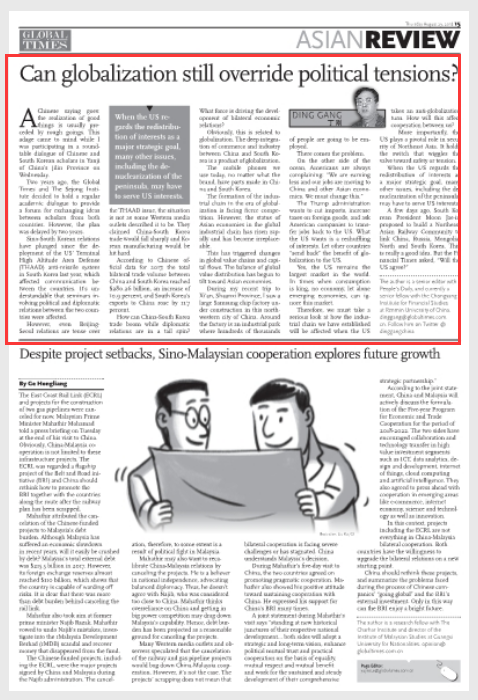Major Power Relations
Your Present Location: PROGRAMS> Major Power RelationsDing Gang: Can globalization still override political tensions?
By Ding Gang Source: Global Times Published: 2018-8-22
A Chinese saying goes: the realization of good things is usually preceded by rough goings. This adage came to mind while I was participating in a round-table dialogue of Chinese and South Korean scholars in Yanji of China's Jilin Province on Wednesday.

Two years ago, the Global Times and The Sejong Institute decided to hold a regular academic dialogue to provide a forum for exchanging ideas between scholars from both countries. However, the plan was delayed by two years.
Sino-South Korean relations have plunged since the deployment of the US' Terminal High Altitude Area Defense (THAAD) anti-missile system in South Korea last year, which affected communication between the countries. It's understandable that seminars involving political and diplomatic relations between the two countries were affected.
However, even Beijing-Seoul relations are tense over the THAAD issue, the situation is not as some Western media outlets described it to be. They claimed China-South Korea trade would fall sharply and Korean manufacturing would be hit hard.
According to Chinese official data for 2017, the total bilateral trade volume between China and South Korea reached $280.26 billion, an increase of 10.9 percent, and South Korea's exports to China rose by 11.7 percent.
How can China-South Korea trade boom while diplomatic relations are in a tail spin? What force is driving the development of bilateral economic relations?
Obviously, this is related to globalization. The deep integration of commerce and industry between China and South Korea is a product of globalization.
The mobile phones we use today, no matter what the brand, have parts made in China and South Korea.
The formation of the industrial chain in the era of globalization is facing fierce competition. However, the status of Asian economies in the global industrial chain has risen rapidly and has become irreplaceable.
This has triggered changes in global value chains and capital flows. The balance of global value distribution has begun to tilt toward Asian economies.
During my recent trip to Xi'an, Shaanxi Province, I saw a large Samsung chip factory under construction in this northwestern city of China. Around the factory is an industrial park where hundreds of thousands of people are going to be employed.
There comes the problem.
On the other side of the ocean, Americans are always complaining: "We are earning less and our jobs are moving to China and other Asian economies. We must change this."
The Trump administration wants to cut imports, increase taxes on foreign goods, and ask American companies to transfer jobs back to the US. What the US wants is a reshuffling of interests. Let other countries "send back" the benefit of globalization to the US.
Yes, the US remains the largest market in the world. In times when consumption is king, no economy, let alone emerging economies, can ignore this market.
Therefore, we must take a serious look at how the industrial chain we have established will be affected when the US takes an anti-globalization turn. How will this affect cooperation between us?
More importantly, the US plays a pivotal role in security of Northeast Asia. It holds the switch that wiggles the valve toward safety or tension.
When the US regards the redistribution of interests as a major strategic goal, many other issues, including the denuclearization of the peninsula, may have to serve US interests.
A few days ago, South Korean President Moon Jae-in proposed to build a Northeast Asian Railway Community to link China, Russia, Mongolia, North and South Korea. This is really a good idea. But the Financial Times asked, "Will the US agree?"
The author is a senior fellow with the Chongyang Institute for Financial Studies at Renmin University of China.























































































 京公网安备 11010802037854号
京公网安备 11010802037854号





